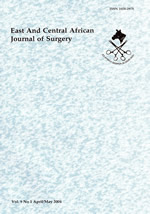
|
East and Central African Journal of Surgery
Association of Surgeons of East Africa and College of Surgeons of East Central and Southern Africa
ISSN: 1024-297X
EISSN: 1024-297X
Vol. 11, No. 1, 2006, pp. 102-107
|
 Bioline Code: js06023
Bioline Code: js06023
Full paper language: English
Document type: Research Article
Document available free of charge
|
|
|
East and Central African Journal of Surgery, Vol. 11, No. 1, 2006, pp. 102-107
| en |
Warm-Blooded Animal Bites
R.A. Dieter, Robert S. Dieter, R.A. Dieter, D.L. Dieter, J.D.
Abstract
Background:
Domestic animals are the major cause of warm-blooded animal bites around the world. The dog, the cat and human bites are the most common animal bites creating major medical and health care concerns requiring medical treatment. Transmitted zoonotic diseases (especially viral) as well as the long-term consequences of the injury are of important concern. Prevention is key both in avoidance of contact and in proper immunization and vaccination evaluation. Treatment requires appropriate examination and procedural care. Soaking and cleansing may be all that is necessary or extensive radical debridement and long-term hospitalization to avoid serious deformity and death.
Conclusion:
Mammalian or Warm-blooded animal bites occur with a high frequency around the world. It is estimated that one half of the world’s population will be bitten at some time during their life. Thus, avoidance is key.
|
| |
© Copyright 2006 - East and Central African Journal of Surgery
|
|
